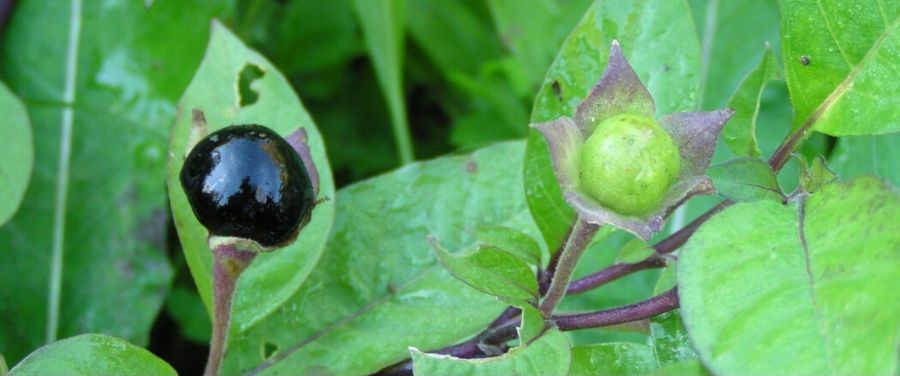WHAT IS ATROPA BELLADONNA?
Belladonna is a perennial herbaceous plant, whose leafs and roots are used to make medicine. It is native to North Africa, Europe and Western Asia. It is also naturalized or introduced in some parts of the United States and Canada.
It is not certain whether it is effective in treating any medical condition. It can be toxic. Medicinal use of belladonna has not been approved by the FDA. It should not be consumed in place of medication prescribed for you by your doctor.
Other Names: Atropa belladonna, Atropa acuminata, Baccifère, Belladona, Belladone, Belle-Dame, Belle—Galante, Cerise du Diable, Cerise Enragée, Cerise d’Espagne, Bouton Noir, Deadly Nightshade, Devil’s Cherries, Devil’s Herb, Dwayberry, Grande Morelle, Great Morel, Divale, Dwale, Guigne de la Côte, Herbe à la Mort, Herbe du Diable, Indian Belladonna, Naughty Man’s Cherries, Morelle Furieuse, Poison Black Cherries and Suchi.

HOW DOES IT WORK?
Belladonna has many chemicals that can block functions of the nervous system. Some of the bodily functions regulated by the nervous system include pupil size, urination, salivation, sweating, digestive functions, and others.
USES OF ATROPA BELLADONNA:
It has been used in alternative medicines as an aid in treating —
- Asthma
- Whooping cough
- Colds
- Hay fever
- Parkinson’s disease
- Motion sickness
- Arthritis—like pain
- Nerve problems
- Hemorrhoids
- Spasms and colic—like pain in the stomach and bile ducts
- Irritable bowel syndrome (IBS)
SIDE EFFECTS OF ATROPA BELLADONNA:
Belladonna contains chemicals that can be toxic and it is likely unsafe when taken by mouth. Its side-effects may include —
- Dry mouth
- Enlarged pupils
- Blurred vision
- Red dry skin
- Fever
- Fast heartbeat
- Inability to urinate or sweat
- Hallucinations
- Spasms
- Mental problems
- Convulsions
- Coma
PRECAUTIONS AND WARNINGS:
- It might cause rapid heartbeat and might make CHF (Congestive heart failure) worse
- It might make constipation worse
- People suffering from down syndrome might be extra—sensitive to potentially toxic chemicals present in it and their harmful effects
- It might make esophageal reflux worse
- It might increase the risk of overheating in individuals with fever
- It might make stomach ulcers worse
- It might slow emptying of the intestine, causing the retention of bacteria and viruses that can cause infection
- Belladonna might make obstructive gastrointestinal (GI) tract diseases worse
- Belladonna might make hiatal hernia worse
- Its excessive amount can increase the problem of blood pressure. It might make blood pressure become too high in the individuals with hypertension or high blood pressure
- It might make narrow—angle glaucoma worse
- Its excessive amounts might worsen the psychiatric disorders
- It might make rapid heartbeat worse
- It might promote complications of ulcerative colitis
- Belladonna might make urinary retention worse.
- The product is likely not safe when taken by mouth during pregnancy because belladonna contains potentially toxic chemicals and it can cause serious side effects
- Belladonna is not safe during breast—feeding. It can reduce milk production and also passes into the breast milk.
ATROPA BELLADONNA DOSAGE:
The correct dose of belladonna depends on different factors including age, health, and several other conditions.

At the same time there is not enough scientific information to determine an appropriate range of doses for this product. Always remember that natural products aren’t always necessarily safe and dosages can be important. So before taking, consult your physician or other healthcare professional.
WHAT HAPPENS IF I MISS A DOSE OF ATROPA BELLADONNA?
You just need to skip the missed dose and take the next regularly scheduled dose. Don’t take two doses at the same time.
WHAT SHOULD I AVOID WHILE TAKING BELLADONNA?
- Avoid consuming belladonna, if you have a fever
- Avoid driving or hazardous activity until you know how belladonna will affect you. It may cause blurred vision and may impair your reactions
- Avoid becoming dehydrated or overheated during a workout and in hot weather. It can decrease sweating and you may be more prone to heat stroke
WHAT OTHER DRUGS WILL AFFECT BELLADONNA?
Ask your doctor or healthcare provider before taking belladonna with any other medications, especially —
- Medication to treat anxiety, depression and mood disorders
- Cold or allergy medicine (Benadryl and others)
- Medicine to treat Parkinson’s disease
- Bronchodilator asthma medication
- Medication to treat motion sickness, stomach problems, or irritable bowel syndrome
- Medication to treat overactive bladder
REFERENCES:
- Belladonna; Drugs.com, Medically reviewed by Drugs.com on Mar 8, 2019 – Written by Cerner Multum
- Belladonna; Rx List
- Uses and Risks of Belladonna; WebMd.com
- Belladonna; Britannica.com, Written By: The Editors of Encyclopaedia Britannica
- The Health Benefits of Belladonna; VerywellHealth.com, By Cathy Wong; Medically reviewed by Lana Butner, ND, LAc on April 27, 2020
- Atropa Belladonna intoxication: a case report; Mohamed Adnane Berdai, Smael Labib, Khadija Chetouani, and Mustapha Harandou; PMCID: PMC3361210; PMID: 22655106
RELATED ARTICLES:
